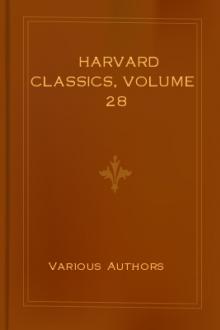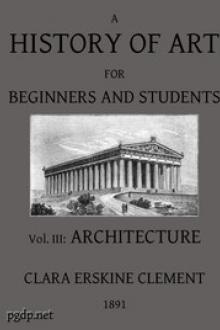Chronicle and Romance, - [ready to read books .TXT] 📗

- Author: -
- Performer: -
Book online «Chronicle and Romance, - [ready to read books .TXT] 📗». Author -
Oxford is supposed to contain in longitude eighteen degrees and eight and twenty minutes, and in latitude one and fifty degrees and fifty minutes: whereas that of Cambridge standing more northerly, hath twenty degrees and twenty minutes in longitude, and thereunto fifty and two degrees and fifteen minutes in latitude, as by exact supputation is easy to be found.
The colleges of Oxford, for curious workmanship and private commodities, are much more stately, magnificent, and commodious than those of Cambridge: and thereunto the streets of the town for the most part are more large and comely. But for uniformity of building, orderly compaction, and politic regiment, the town of Cambridge, as the newer workmanship,[152] exceeds that of Oxford (which otherwise is, and hath been, the greater of the two) by many a fold (as I guess), although I know divers that are of the contrary opinion. This also is certain, that whatsoever the difference be in building of the town streets, the townsmen of both are glad when they may match and annoy the students, by encroaching upon their liberties, and keep them bare by extreme sale of their wares, whereby many of them become rich for a time, but afterward fall again into poverty, because that goods evil gotten do seldom long endure.[153]…
In each of these universities also is likewise a church dedicated to the Virgin Mary, wherein once in the year—to wit, in July—the scholars are holden, and in which such as have been called to any degree in the year precedent do there receive the accomplishment of the same, in solemn and sumptuous manner. In Oxford this solemnity is called an Act, but in Cambridge they use the French word Commencement; and such resort is made yearly unto the same from all parts of the land by the friends of those who do proceed that all the town is hardly able to receive and lodge those guests. When and by whom the churches aforesaid were built I have elsewhere made relation. That of Oxford also was repaired in the time of Edward the Fourth and Henry the Seventh, when Doctor Fitz James, a great helper in that work, was warden of Merton College; but ere long, after it was finished, one tempest in a night so defaced the same that it left few pinnacles standing about the church and steeple, which since that time have never been repaired. There were sometime four and twenty parish churches in the town and suburbs; but now there are scarcely sixteen. There have been also 1200 burgesses, of which 400 dwelt in the suburbs; and so many students were there in the time of Henry the Third that he allowed them twenty miles compass about the town for their provision of victuals.
The common schools of Cambridge also are far more beautiful than those of Oxford, only the Divinity School of Oxford excepted, which for fine and excellent workmanship cometh next the mould of the King's Chapel in Cambridge, than the which two, with the Chapel that King Henry the Seventh did build at Westminster, there are not (in my opinion) made of lime and stone three more notable piles within the compass of Europe.
In all the other things there is so great equality between these two universities as no man can imagine how to set down any greater, so that they seem to be the body of one well-ordered commonwealth, only divided by distance of place and not in friendly consent and orders. In speaking therefore of the one I cannot but describe the other; and in commendation of the first I cannot but extol the latter; and, so much the rather, for that they are both so dear unto me as that I cannot readily tell unto whether of them I owe the most good-will. Would to God my knowledge were such as that neither of them might have cause to be ashamed of their pupil, or my power so great that I might worthily requite them both for those manifold kindnesses that I have received of them! But to leave these things, and proceed with other more convenient to my purpose.
The manner to live in these universities is not as in some other of foreign countries we see daily to happen, where the students are enforced for want of such houses to dwell in common inns, and taverns, without all order or discipline. But in these our colleges we live in such exact order, and under so precise rules of government, as that the famous learned man Erasmus of Rotterdam, being here among us fifty years passed, did not let to compare the trades in living of students in these two places, even with the very rules and orders of the ancient monks, affirming moreover, in flat words, our orders to be such as not only came near unto, but rather far exceeded, all the monastical institutions that ever were devised.
In most of our colleges there are also great numbers of students, of which many are found by the revenues of the houses and other by the purveyances and help of their rich friends, whereby in some one college you shall have two hundred scholars, in others an hundred and fifty, in divers a hundred and forty, and in the rest less numbers, as the capacity of the said houses is able to receive: so that at this present, of one sort and other, there are about three thousand students nourished in them both (as by a late survey it manifestly appeared). They were erected by their founders at the first only for poor men's sons, whose parents were not able to bring them up unto learning; but now they have the least benefit of them, by reason the rich do so encroach upon them. And so far has this inconvenience spread itself that it is in my time a hard matter for a poor man's child to come by a fellowship (though he be never so good a scholar and worthy of that room). Such packing also is used at elections that not he which best deserveth, but he that has most friends, though he be the worst scholar, is always surest to speed, which will turn in the end to the overthrow of learning. That some gentlemen also whose friends have been in times past benefactors to certain of those houses do intrude into the disposition of their estates without all respect of order or statutes devised by the founders, only thereby to place whom they think good (and not without some hope of gain), the case is too too evident: and their attempt would soon take place if their superiors did not provide to bridle their endeavours. In some grammar schools likewise which send scholars to these universities, it is lamentable to see what bribery is used; for, ere the scholar can be preferred, such bribage is made that poor men's children are commonly shut out, and the richer sort received (who in time past thought it dishonour to live as it were upon alms), and yet, being placed, most of them study little other than histories, tables, dice, and trifles, as men that make not the living by their study the end of their purposes, which is a lamentable hearing. Beside this, being for the most part either gentlemen or rich men's sons, they often bring the universities into much slander. For, standing upon their reputation and liberty, they ruffle and roist it out, exceeding in apparel, and banting riotous company (which draweth them from their books unto another trade), and for excuse, when they are charged with breach of all good order, think it sufficient to say that they be gentlemen, which grieveth many not a little. But to proceed with the rest.
Every one of these colleges have in like manner their professors or readers of the tongues and several sciences, as they call them, which daily trade up the youth there abiding privately in their halls, to the end they may be able afterward (when their turn cometh about, which is after twelve terms) to shew themselves abroad, by going from thence into the common schools and public disputations (as it were "In aream") there to try their skill, and declare how they have profited since their coming thither.
Moreover, in the public schools of both the universities, there are found at the prince's charge (and that very largely) fine professors and readers, that is to say, of divinity, of the civil law, physic, the Hebrew and the Greek tongues. And for the other lectures, as of philosophy, logic, rhetoric, and the quadrivials (although the latter, I mean arithmetic, music, geometry, and astronomy, and with them all skill in the perspectives, are now smally regarded in either of them), the universities themselves do allow competent stipends to such as read the same, whereby they are sufficiently provided for, touching the maintenance of their estates, and no less encouraged to be diligent in their functions.
These professors in like sort have all the rule of disputations and other school exercises which are daily used in common schools severally assigned to each of them, and such of their hearers as by their skill shewed in the said disputations are thought to have attained to any convenient ripeness of knowledge according to the custom of other universities (although not in like order) are permitted solemnly to take their deserved degrees of school in the same science and faculty wherein they have spent their travel. From that time forward also they use such difference in apparel as becometh their callings, tendeth unto gravity, and maketh them known to be called to some countenance.
The first degree is that of the general sophisters, from whence, when they have learned more sufficiently the rules of logic, rhetoric, and obtained thereto competent skill in philosophy, and in the mathematicals, they ascend higher unto the estate of bachelors of art, after four years of their entrance into their sophistry. From thence also, giving their minds to more perfect knowledge in some or all the other liberal sciences and the tongues, they rise at the last (to wit, after other three or four years) to be called masters of art, each of them being at that time reputed for a doctor in his faculty, if he profess but one of the said sciences (besides philosophy), or for his general skill, if he be exercised in them all. After this they are permitted to choose what other of the higher studies them liketh to follow, whether it be divinity, law, or physic, so that, being once masters of art, the next degree, if they follow physic, is the doctorship belonging to that profession; and likewise in the study of the law, if they bend their minds to the knowledge of the same. But, if they mean to go forward with divinity, this is the order used in that profession. First, after they have necessarily proceeded masters of art, they preach one sermon to the people in English, and another to the university in Latin. They answer all comers also in their own persons unto two several questions of divinity in the open schools at one time for the space of two hours, and afterward reply twice against some other man upon a like number and on two several dates in the same place, which being done with commendation, he receiveth the fourth degree, that is, bachelor of divinity, but not before he has been master of arts by the space of seven years, according to their statutes.
The next, and last degree of all, is the doctorship, after other





Comments (0)